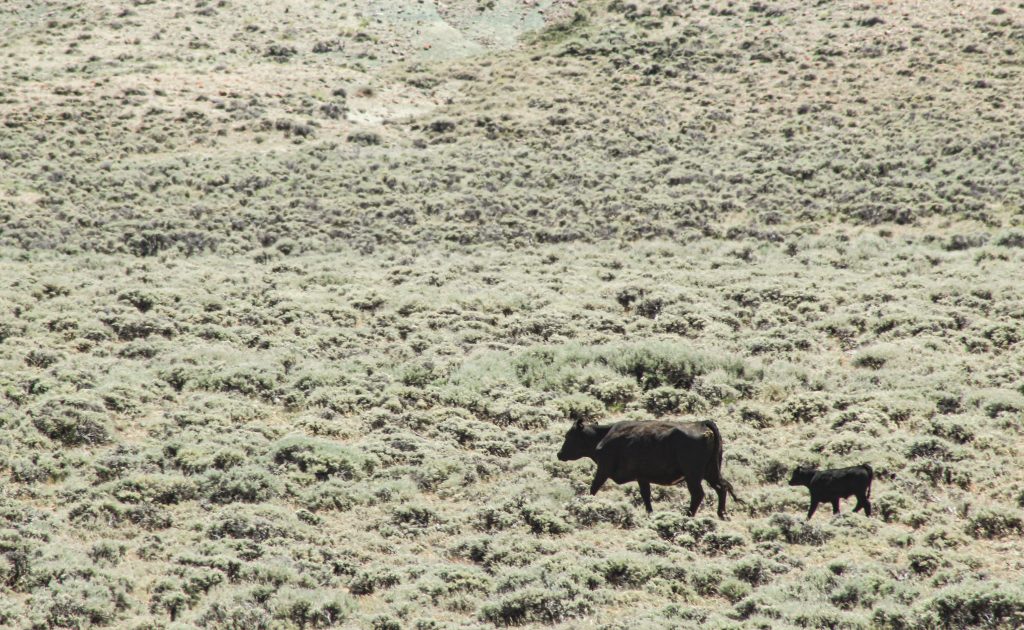Summer Sickness: Experts offer advice for identifying, treating and preventing pasture pneumonia in calves

For many ranchers, the stressors of calving and branding seasons are in the rearview mirror come summertime. As attention turns to putting up hay and preparing for winter, it is easy to adopt an out of sight, out of mind approach to managing cow herds.
However, experts remind producers to remain wary of health conditions plaguing cow herds in summer.
As seasons change, it’s important to have a plan for recognizing, treating and preventing a common seasonal illness – pasture pneumonia.
What is pasture pneumonia?
Pasture pneumonia – also referred to as summer pneumonia – is a respiratory illness commonly affecting pre-weaned calves on pasture. It is caused by a combination of viral, bacterial and environmental stressors and can be fatal if not addressed quickly.
Indicators of pasture pneumonia in calves can include depression, isolation, inappetence, cough and nasal and ocular discharge, as well as fever and difficulty breathing, according to a June 2023 University of Nebraska-Lincoln (UNL) BeefWatch article written by Veterinarians Drs. Halden Clark and Becky Funk, along with UNL Extension Educator Aaron Berger.
Pasture pneumonia primarily occurs in late summer or early fall, but an outbreak can happen at any time given the right combination of factors.
According to the Kansas State University (KSU) Beef Cattle Institute (BCI), stressors such as dust, temperature swings between afternoon highs and nighttime lows and close contact with other calves can increase the risk of pasture pneumonia.
Prevention and treatment plans for pasture pneumonia consist primarily of proper vaccination and nutrition measures.
Recognizing the signs
Symptoms of pasture pneumonia can be easy to overlook, but there are several physical and behavioral hallmarks which could indicate an outbreak has taken hold of a herd.
A report by BCI notes, because cattle grazing pastures are not typically monitored on a daily basis, an early sign of pasture pneumonia may be finding dead calves in the midst of other calves exhibiting symptoms like rapid breathing, sluggishness and fever.
South Dakota State University (SDSU) Extension Veterinarian Dr. Russ Daly further emphasizes signs of respiratory disease do not always include breathing problems, although such symptoms may become more obvious when trailing cattle.
Daly points to sluggishness, droopy ears and difficulty keeping up with the herd as good indicators pasture pneumonia may have taken hold.
According to Clark and Funk, depression and isolation are two more common behavioral symptoms observed in affected calves. The two experts also note calves with pasture pneumonia may exhibit signs of nasal and ocular discharge in addition to a shrunk-up abdominal appearance.
Treating the symptoms
With early detection, pasture pneumonia is generally curable. Common treatment options include vaccination and reducing environmental stressors.
“Calves exhibiting signs of pneumonia should be treated with injectable antibiotics to combat bacterial causes of respiratory disease,” comments Dr. Bob Larson in a 2023 BCI report. “If treated early enough in the disease process, many calves are likely to recover. However, calves with advanced lung damage may not respond to treatment.”
Larson further notes the infection can be viral and therefore immune to antibiotic treatment. In such cases, treatment turns to reducing environmental stressors and isolating the infected animal to decrease further spread.
Pathogens most often associated with pasture pneumonia include bovine coronavirus and bovine respiratory syncytial virus (BRSV), according to a KSU veterinary diagnostic report titled “Bovine Summer Pneumonia” written by Drs. Giselle Cino, Pankaj Kumar, Kelli Almes and Gregg Hanzlicek.
“If the pneumonia is caused by a virus such as BRSV, antibiotic treatment will not be a directly effective treatment,” Larson notes. “In addition to antibiotic treatment, young calves with pneumonia should be protected from weather extremes, dusty conditions and poor forage. This may require moving them and their dam to a new pasture or grass trap.”
Preventing an outbreak
The most effective safeguard against losses from pasture pneumonia is prevention. Preventing pasture pneumonia begins long before turnout with a proper vaccination routine and nutrition program.
As stated by the Intermountain Farmers Association, preventative vaccines train the calf’s immune system to recognize and fight viruses and bacteria encountered later in life. Therefore, vaccinating young calves in the springtime before putting them out for summer can aid in the fight against pasture pneumonia.
Researchers also highlight good colostrum management, mineral supplementation and attention to energy and protein nutrition as important aspects of preventing pasture pneumonia. This means prevention starts far before turnout in some of the earliest hours of a calf’s life.
Clark and Funk note colostrum intake is a crucial part of the first 24 hours after birth, delivering important antibodies which decrease throughout the following months.
They also highlight attention to energy and protein intake as critical functions of supporting immune function and disease resilience. As pasture quality decreases in late summer and early fall, attention around supplemental nutrition may need to increase.
Key takeaways
Focusing on overall herd health by providing adequate nutrition, timely vaccination and proper environment can reduce the risk of pasture pneumonia in beef calves.
If an outbreak does occur, experts recommend veterinary consultation, vaccination and continued monitoring of symptoms as treatment options.
Although outbreaks of diseases like pasture pneumonia are not always avoidable, having the tools to recognize and treat the symptoms can help minimize losses.
Identifying symptoms, administering treatment and developing a prevention plan for pasture pneumonia can help ranchers ensure healthy and happy calves all summer long for years to come.
Grace Skavdahl is the editor of the Wyoming Livestock Roundup. Send comments on this article to roundup@wylr.net.





